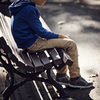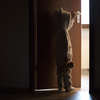
COVID-19 survivors gather in New York and put stickers depicting lost relatives on a wall to commemorate those who died during the pandemic.
Stefan Jeremiah / AP
Hide caption
Toggle caption
Stefan Jeremiah / AP

COVID-19 survivors gather in New York and put stickers depicting lost relatives on a wall to commemorate those who died during the pandemic.
Stefan Jeremiah / AP
Of all the sad statistics the US has processed over the past year and a half, here is one particularly difficult one: A new study estimates that more than 140,000 children in the US have lost a parent or grandparent caregiver to COVID-19. The majority of these children are from racial and ethnic minorities.
“That means that out of four COVID-19 deaths, one child was left without a mother, father and / or grandparent to provide for the child’s domestic needs and care – needs like love, security and daily care,” says Susan Hillis, Epidemiologist at the Centers for Disease Control and Prevention and lead author of the new study.
The study, which took place on Thursday in t. has been publishedhe diary Pediatrics, estimated the number of damage from April 1, 2020 to the end of June 2021 at 140,000. And that number has risen in the last three months: Hillis estimates it today at around 175,000.
“That number will continue to rise as long as our pandemic deaths increase,” says Hillis.
These children will need support
Once a child loses their parent or primary caregiver, Hillis says, tragedy is something they live with “throughout their childhood.”

It is a situation that requires urgent action, notes Hillis. These children need “understanding, help, support,” she says. And it is important “to ensure that they have a safe and loving family to continue to support and care for their needs.”
And just as COVID-19 has killed more people in communities of color, children in those communities are hardest hit by the loss of parents and primary caregivers.
“Sixty-five percent of all children who experience a COVID-associated orphanage or the death of their primary caregiver belong to a racial and ethnic minority,” says Hillis. “It’s such an extreme difference.”
The study defines orphanage as the death of one or both parents. The study also tracked the loss of caring grandparents.
And if you take a closer look at individual groups, Native American and Alaskan children are 4.5 times more likely than white children to have lost a primary caregiver. Black children were 2.4 times more likely and Hispanic children almost twice as likely.
The loss of a parent or caregiver in childhood is a significant trauma. The study finds that this type of adverse childhood experience “can lead to profound long-term effects on the health and well-being of children”.
“Adverse childhood experiences are linked to an increased risk of any major cause of adult death,” says Hillis.
Losing a parent has other long-term effects
And in the short term, the loss of a parent or primary caregiver can lead to mental crisis for children, including an increased risk of suicide, says Hillis, and “increased exposure to sexual, physical and emotional violence and exploitation.”
And when it comes to life outcomes, a number of previous research shows that losing a parent can put children at greater risk of economic, food and housing insecurity.


This adds a new level of danger to children in colored communities who are already disadvantaged.
These communities experience inequalities in access to health care, housing, education and other factors that contribute to children’s well-being, says Dr. Warren Ng, a psychiatrist at Columbia University who works primarily with children in colored communities.
“The numbers don’t tell the whole story,” he says. “The whole story is really about the life and the affected future of these children and young people and their families.”
Many children couldn’t even say goodbye
Psychiatrists, seeing the psychological impact of the pandemic on children, say these losses are particularly traumatic. Ng says even mourning was difficult for them – many didn’t even see their parents or grandparents in the hospital or say goodbye.
“One of the unique things about the pandemic is that it not only robs us of a loved one, but also robs us of our opportunities to come together for families to heal. [and] support each other to really get through the toughest times in life, “he says.
The study authors also call for political action. “We suggest seriously considering adding a fourth pillar to our COVID response, and that fourth pillar would be childcare,” says Hillis.
This would mean finding resources and developing systems to “find the children, assess how they are doing and link them to appropriate care,” she says, and economic support for families who look after the children to strengthen.
The data highlighted here, particularly the racial and ethnic inequalities, “really call for an urgent and effective response for all children,” says Hillis.
Thank You For Reading!
Reference: www.npr.org
